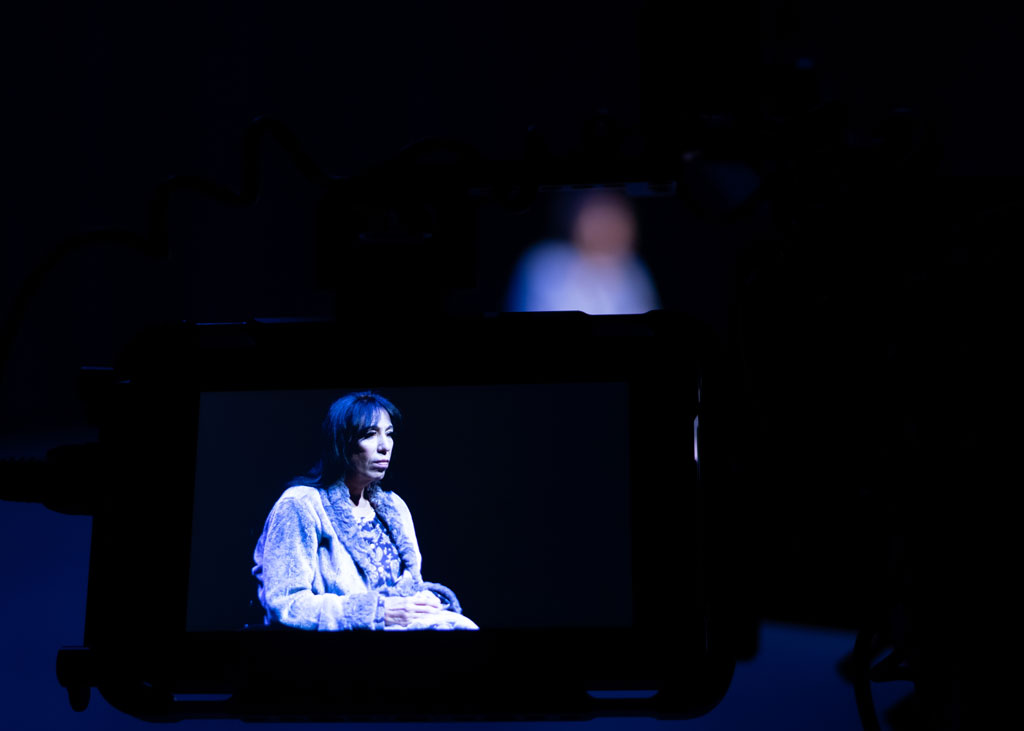Leave No Bodymind Behind
Sins Invalid’s Vision of Crip Sustainability
DOI:
https://doi.org/10.7146/peri.v19i37.135194Resumé
This article discusses how the work of US-collective Sins Invalid, particularly the 2021 documentary Loving with Three Hearts and 2020 performance piece We Love Like Barnacles, addresses the exclusion of disabled people, especially multiply marginalised disabled people, in discourses and practices that address ecological disaster. The article argues that the company positions ableism as a crucial part of said exclusion and with their work proposes a version of sustainability that is rooted in collective access and care.
Referencer
Alaimo, Stacy, 2012. Sustainable This, Sustainable That: New Materialisms, Posthumanism, and Unknown Futures. PMLA, vol. 127, no. 3, pp. 558–64.
Berne, Patty, 2015. Disability Justice – a working draft by Patty Berne. Online at: <https://www.sinsinvalid.org/blog/disability-justice-a-working-draft-by-patty-berne> (accessed 5.10.22).
Berne, Patty and Sins Invalid, 2015. 10 Principles of Disability Justice. Online at: <https://static1.squarespace.com/static/5bed3674f8370ad8c02efd9a/t/5f1f0783916d8a179c46126d/1595869064521/10_Principles_of_DJ-2ndEd.pdf> (accessed 17.4.22).
Clare, Eli, 2017. Notes on Natural Worlds, Disabled Bodies, and a Politics of Cure. In: Sarah Jaquette Ray, Jay Sibara, and Stacy Alaimo (ed.). Disability Studies and the Environmental Humanities: Toward an Eco-Crip Theory. Lincoln: University of Nebraska Press, pp. 242-267.
Dworetzky, Joe, 2020. Sins Invalid to stream performance about climate change and its impact on the disabled community. Local News Matters. Online at: <https://localnewsmatters.org/2020/10/22/sins-invalid-to-stream-performance-about-climate-change-and-its-impact-on-the-disabled-community-october-23-25/> (accessed 5.5.22).
Elysium, Rose Iris Theodosia, 2020, Crip brilliance transcending the theatre. Medium Blog. Online at <https://ryanthea.medium.com/crip-brilliance-transcending-the-theater-b0ecd0ea7242> (accessed 10.5.22).
Hall, Kim Q., 2017. Cripping Sustainability, Realizing Food Justice, In: Sarah Jacquette Ray and J.C. Sibara (ed.). Disability Studies and the Environmental Humanities: An Anthology. Lincoln: University of Nebraska Press, pp. 422-446.
Jampel, Catherine, 2018. Intersections of disability justice, racial justice and environmental justice. Environmental Sociology, 4:1, p. 122-135. Online at DOI:10.1080/23251042.2018.1424497 (accessed 15.11.2022).
Johnson, Valerie-Ann, 2017. Bringing Together Feminist Disability Studies and Environmental Justice. In: Sarah Jaquette Ray, Jay Sibara, and Stacy Alaimo (ed.). Disability Studies and the Environmental Humanities: Toward an Eco-Crip Theory. Lincoln: University of Nebraska Press, pp. 73-93.
Kafer, Alison, 2013. Feminist Queer Crip. Bloomington: Indiana University Press.
McRuer, Robert, 2002. Compulsory Able-Bodiedness and Queer/Disabled Existence. In: Rosemarie Garland-Thomson, Brenda Jo Brueggemann, and Sharon L. Snyder (ed.). Disability Studies: Enabling the Humanities. New York: MLA Publications, pp. 88-99.
Pentilla, Annie, 2014. Embodying Our Humanity: Performance Project “Sins Invalid” Promotes Disability Justice Through Live Performance Arts. Tikkun Daily Blog. Online at: <https://truthout.org/articles/embodying-our-humanity-sins-invalid-promotes-disability-justice-through-live-performance-arts/> (accessed 14.5.22).
Piepzna-Samarasinha, Leah Lakshmi, 2018. Care Work: Dreaming Disability Justice. Vancouver: Arsenal Pulp Press.
Ray, Sarah Jacquette, 2013. The Ecological Other: Environmental Exclusion in American Culture. Tucson: University of Arizona Press.
Sins Invalid Blog, 2011. Have you found a date for the Sins Invalid webstreaming yet? Online at: <https://www.sinsinvalid.org/blog/have-you-found-a-date-for-the-sins-invalid-webstreaming-yet?rq=online> (accessed 10.5.22).
Sins Invalid News, 2020. Social Distancing and Crip Survival: A Disability Centered Response to COVID-19. Online at: <https://www.sinsinvalid.org/news-1/2020/3/19/social-distancing-and-crip-survival-a-disability-centered-response-to-covid-19> (accessed 10.5.22).
Sins Invalid News, 2021. Loving with Three Hearts: Behind the Scenes of the 2020 Sins Invalid Performance. Online at: <https://www.sinsinvalid.org/news-1/2021/8/8/loving-with-three-hearts-behind-the-scenes-of-sins-invalids-2020-performance-d7sef> (accessed 10.5.22).
Sins Invalid, 2011. Sins Webstream. Youtube. Online at: <https://www.youtube.com/watch?v=RfIXMciI2vo> (accessed 14.5.22).
Sins Invalid, 2021. Loving with Three Hearts: Behind the Scenes of the 2020 Sins Invalid Performance. Online at: < https://www.youtube.com/watch?v=SGjV78qgv1Q> (accessed 14.5.22).
Sins Invalid Website, nd. Online at: <https://www.sinsinvalid.org/> (accessed 14.5.22).
Sins Invalid, 2020. We Love Like Barnacles, on demand recording. Online at: <https://vimeo.com/sinsinvalid/vod_pages> (accessed 28.8.22).
Watts Belser, Julia, 2020. Disability, Climate Change, and Environmental Violence: The Politics of Invisibility and the Horizon of Hope. Disability Studies Quarterly. Vol 40, No 4. Fall 2020. Online at: < https://dsq-sds.org/article/view/6959> (accessed 15.11.2022).
Watts Belser, Julia, 2019. Disabled People Cannot Be “Expected Losses” in the Climate Crisis. Truthout Op-Ed. Online at: <https://truthout.org/articles/disabled-people-cannot-be-expected-losses-in-the-climate-crisis/> (accessed 14.5.22).
Weibgen, Adrien A., 2015. The Right To Be Rescued: Disability Justice in an Age of Disaster. The Yale Law Journal 124, no. 7. 2015, pp. 2406–69. <http://www.jstor.org/stable/43617083.>
Wong, Alice. (2019). The Rise and Fall of the Plastic Straw: Sucking in Crip Defiance. Catalyst: Feminism Theory, Technoscience 5, no. 1 : pp. 1-12.

Downloads
Publiceret
Citation/Eksport
Nummer
Sektion
Licens
Det følgende vedrører alle Peripeti-udgivelser fra 2024, nr. 39, og senere:
Peripeti er et Diamond Open Access-tidsskrift, der giver direkte open acces til publiceret indhold ud fra princippet om, at det at gøre forskning frit tilgængelig for offentligheden understøtter en større global udveksling af viden.
Forfattere skal ikke betale for indsendelse, redigering eller offentliggørelse af artikler.
Forfattere, der bidrager til Peripeti, bevarer ophavsretten til deres artikler.
Forfattere accepterer at udgive artikler under en Creative Commons CC-BY-NC 4.0-licens. Vilkårene for denne licens tillader brugere frit at kopiere og videredistribuere materialet i ethvert medie eller format og at tilpasse, transformere og bygge videre på materialet, så længe der gives passende kreditering, et link til licensen gives, og eventuelle ændringer angives. Brugere må ikke dele eller tilpasse materialet til kommercielle formål uden samtykke fra licensgiveren. Brugen af licensen må ikke på nogen måde antyde, at licensgiveren støtter tredjeparten eller dennes brug. Licensen kan ikke tilbagekaldes.
Forfattere opfordres til at lægge deres artikler ud på personlige og/eller institutionelle hjemmesider for at sikre endnu større offentlig adgang efter udgivelsen. Forfattere har ret til at arkivere deres artikler i fondes og offentlige institutioners arkiver, men Peripeti anmoder om, at forfattere bruger et direkte link til den publicerede artikel på tidsskriftets hjemmeside, når det er muligt, da Peripeti som en ikke-kommerciel, offentligt finansieret udgiver er afhængig af niveauet af brugeraktivitet på tidsskriftets hjemmeside.
Vedrørende tidligere udgivelser, indtil 2024, herunder nr. 38:
Ophavsretten deles mellem Peripeti og forfatteren/forfatterne. Tidsskriftet er et open access-tidsskrift, der giver direkte adgang til alt indhold baseret på princippet om, at det at gøre forskning frit tilgængelig for offentligheden understøtter en større global udveksling af viden. Brugere kan frit kopiere og dele materiale i ethvert medie eller format, så længe der gives passende kreditering. Enhver anden brug kræver skriftligt samtykke fra indehaverne af ophavsretten.




